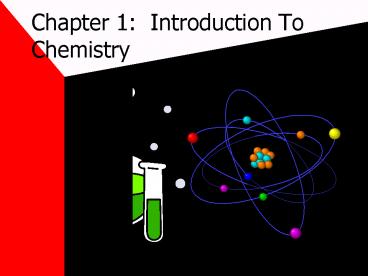Chapter 1: Introduction To Chemistry - PowerPoint PPT Presentation
1 / 9
Title:
Chapter 1: Introduction To Chemistry
Description:
'Chemistry is the study of the composition of matter-the stuff things are made of ... dioxide acts as an isolator of the earth, light rays travel into the atmosphere, ... – PowerPoint PPT presentation
Number of Views:41
Avg rating:3.0/5.0
Title: Chapter 1: Introduction To Chemistry
1
Chapter 1 Introduction To Chemistry
2
Section 1.1 Chemistry
- What Is Chemistry?
- Chemistry is the study of the composition of
matter-the stuff things are made of-and the
changes that matter undergoes. - The Five Major Areas of Study
- 1 Organic Chemistry- the study of essentially
all substances containing carbon. - 2 Inorganic Chemistry- Substances that do not
contain carbon. - 3 Analytical Chemistry- Composition of
substances - 4 Physical Chemistry- theories and experiments
that describe the behavior of chemicals. - 5 Biochemistry- the study of the chemistry of
living organisms.
3
Section1.2Chemistry Far And Wide
- Energy
- Chemistry is creating new energy conservation
methods. - Energy-efficient fuels.
- Sodium lamps used to light up the roads.
- Plants capture the suns energy to create food
using photosynthesis.
4
Section 1.2Chemistry Far and Wide
- Medicine And Biotechnology
- Scientists have the ability to determine the
spatial arrangement of atoms in complex
biological molecules such as proteins. Substances
such as vitamin C, penicillin, and aspirin are
created using this.
5
Section1.2Chemistry Far And Wide
- Agriculture
- Chemistry is used to develop hardier and more
productive plants.
6
Section1.2Chemistry Far And Wide
- The Environment
- Chemists work with Environmentalists to solve
problems in the environment with pollutants. - Every year the amount of Carbon Dioxide (CO2) in
the atmosphere increases and global warming gets
worse. - The carbon dioxide acts as an isolator of the
earth, light rays travel into the atmosphere,
reflect back off the earth but the carbon dioxide
keeps red light in, which is also heat energy.
7
Scientific Method
- Problem to Investigate
- Observations
- Hypothesis-educated guess
- Test Hypothesis
- Theory-most ideas in science
- Test Theory
- Scientific Law-mathematical proof
8
Section1.3Scientific Method
- Scientific Method- one logical approach to the
solution of scientific problems.
9
Section1.3Scientific Method
- Observation-Using you senses to obtain
information directly. - Hypothesis-proposed explanation or reason for
what is observed. - Experiment-a means to test a hypothesis.
- Theory- a broad and extensive tested explanation
of why experiments give certain results.

